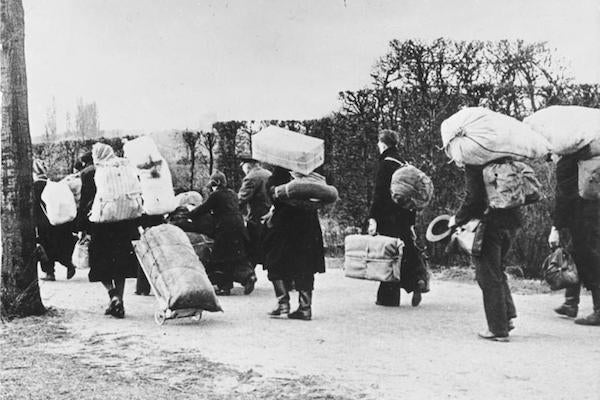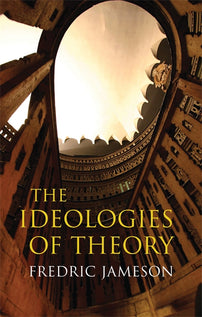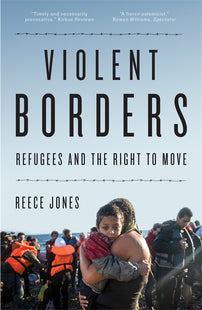The Duty of Hospitality: Oskar Negt's Überlebensglück
Adrian Wilding reviews a new book by critical theorist Oskar Negt, "an autobiography that is also a profound philosophical, psychological and sociological inquiry."

Oskar Negt, Überlebensglück, Göttingen: Steidl, 2016.
One of the most distinguished and perceptive thinkers on the left in Germany, Oskar Negt, has written an autobiography that is also a profound philosophical, psychological and sociological inquiry. His account of a childhood scarred by war, exile, and internment is also a highly topical plea for understanding the plight of the refugee.
The book pieces together a life which, especially for English readers, has hitherto been known only in part, and confirms Negt’s role as a standard-bearer of Frankfurt School “critical theory.” Though many may know that Negt studied under Adorno in Frankfurt, that he was active in the student movement of 1968, and that his collaborations with Alexander Kluge, including Public Sphere and Experience and History and Obstinacy, have been remarkably fruitful, less familiar is Negt’s disaffection with the path taken by Frankfurt School thinking after Adorno’s death, which led him to form a new school for critical theory at the University of Hannover. Leaving Frankfurt in the 1970s, Negt in effect took the spirit of the Frankfurt School with him.
The book’s title is a play on words: it suggests the luck of having survived (Überlebens-Glück), but also the luck or happiness (German makes no distinction between the two) that may characterise one’s life (Über-Lebensglück). Both meanings come to the fore at different points in this memoir. Negt, born in 1934 in a village near Königsberg in East Prussia, the youngest of seven children, recalls a rural childhood, his family’s struggle with money, their eventual purchase of a farm and with it a livelihood, the perennial tribulations of getting by. Despite these adversities, Negt emphasises a relatively idyllic, “happy” early childhood, in part shielded from the storms of the outside world.
Soon enough the idyll would be shattered — Negt’s father’s activism in the Social Democratic Party meant increasing difficulties (and forced compromises) under Nazi rule. Above all, the final months of the war would snatch away every certainty. Separated from his parents during the Red Army’s conquest of Königsberg, the ten-year-old Negt and two of his sisters were first caught up in the brutal siege of the city and then by a stroke of fortune, found a place on one of the ships evacuating civilians across the Baltic. Here the “luck” in the book’s title is never more pertinent: other ships making the same precarious crossing included the Wilhelm Gustloff and the Cap Arcona.
Denmark, the destination, proved no simple sanctuary. The German refugees were placed in an internment camp, and though camp conditions, Negt emphasises, were humane, barbed wire placed absolute limits on their freedom, and essential parts of a child’s development, like schooling, were absent. It was only in late 1947, two and a half years after arriving on Danish territory, that the camp doors were finally opened. Negt’s ordeal was not yet over, though. Upon returning to Germany he and his sisters were placed in a quarantine camp near Rostock before being allowed to join their parents — alive but emaciated — near Berlin, in the Soviet-occupied zone. Nor did the newly formed GDR offer safe haven — Negt’s father’s politics were anathema to the ruling socialists and their one-party state, as they had been to the Nazis — so that in 1951 the family, under increasing threat from the authorities, seized their chance to flee to West Berlin, where they would spend a further six months in accommodations for asylum-seekers. It is an epic tale of flight, displacement, and exile that, alongside Negt, affected almost twelve million Germans (the so-called Heimatvertriebener) and comprises a lesser-known chapter of the war. Only in 1955 would the Negt family find a new home, in Oldenburg in Lower Saxony, ten years after their exile had begun.
Negt’s is no simple chronological reminiscence. The difficult years of flight, transit, and confinement loom large because of the deeper, topical argument he wishes to make: forced migration is one of the most pressing issues of our time, and we have yet to learn the lessons of the past. The trauma of exile is a splinter in the eye which can magnify the present.
Überlebensglück takes its place in a tradition of autobiographical reflections within critical theory. One thinks of Walter Benjamin’s Berlin Chronicle or Theodor Adorno’s recollections of his childhood in rural Amorbach, works which, where they seem most personal, take up profound psychological and philosophical themes. They do so in terms of both form and content. In formal terms they subvert that reified consciousness of time that only works linearly; they brush a life-story against the grain. Like Benjamin’s and Adorno’s memoirs, Negt records a life not in calendar time, like a diary, but by juxtaposing moments which connect directly to present concerns. For Negt, as for Benjamin, memory is a matter of interpretation — a past is always a product of a present and of present interests. For Benjamin history itself should be viewed this way, as collective memory, similarly uneven and retroactive. The past — particularly past injustice — is inextricably linked to present struggles; it is incomplete, can be altered, “redeemed.”
For these critical theorists, the content of recollection, particularly childhood, is of interest in its own right, since it puts the reality principle of an alienated world in doubtful light. The child’s early explorations are not yet subsumed under the principles of instrumentality and identity; in childhood the means–end spirit of capitalism has yet to take root. For the infant, each “thing” in the world is enchanted, providential; it is handled convivially rather than as resource for exploitation or control. In child-raising, not the exchange of goods but the giving of gifts (above all, care) is the order of the day; these have no price and demand no equivalent in return. “Universal exchangeability” (Adorno), the “law of value” (Marx), have no place there. Childhood is a utopian reminder of a world where things — and people — are more than mere commodities; it is where we first learn that another world is possible.
Which is why shattering the delicate web of childhood interactions — for example, in war, flight, homelessness — can have profound effects on psychic development. For Negt, “the experience of brokenness during childhood, fear and need in a child’s early development” can “place in question or even destroy…the emotional foundations of psychic life.” (p.220) The relationships which will shape our attitudes towards others and towards what is different or strange are nurtured or threatened at the earliest age: “precisely in the pre-linguistic life of the child the senses only awaken when they meet with friendly responses,” (ibid.) responses which can determine whether the adult becomes open-minded and empathetic or defensive and prejudiced.
Even in life’s early stages, coercion, constraint, the constriction of movement, each prepare the ground for social fears, where a hardened ego becomes hostile to strangers while remaining as brittle as a prosthesis. To the extent that ego-hardening arises through exclusion of others, moral autonomy is also lost and one’s own unsatisfied life is compensated for by jealousy (221).
The “unsatisfied life” easily contorts into that xenophobia which is more and more visible in political life today. The rightward shift in European (especially German) politics, only inadequately defined as “populism,” involves a startling loss of empathy and solidarity that has deep social, economic, and psychological roots.
Negt devotes considerable space to analysing Germany’s Janus-faced attitude to refugees. For all the appearance of conflict-free governance, contemporary Germany is awash with contradictions. It is the land of a spontaneous Willkommenskultur, which in 2016 opened its borders, taking in more refugees than any other EU country, which just as quickly shut them again once popular opinion (the plaything of tabloids and fake news) began to turn. The welcoming hand quickly closed into an iron fist and old fears and resentments, barely hidden beneath the veneer of the Rechtsstaat, reappeared. Merkel’s managerialism may have only aggravated the problem. Her laudable “we can do it!” (wir schaffen das!) certainly launched a mass programme of asylum-home building, application-processing, and integration courses, but took place in the ethical vacuum of a politics where substantial issues — for instance Europe’s role in destabilising the Middle-East, in selling arms to dictators, in fuelling climate change — go undiscussed. In Germany, there is a veneer of political debate: the Bundestag in effect delegates politics to the media, particularly to an industry of late-night talk shows which serve as echo-chambers for a right-wing tabloid press. There one is unlikely to find talk of migration’s causes, nor of the poverty and lack of prospects that lead people to blame their own oppression on migrants. Germany is a parody of a public sphere (as Negt’s early work foretold) which the new social media have done little to democratise; there Breitbart lies about Muslim violence have travelled across the globe before the truth has put on its boots.
The results of this are explosive. 2016 saw almost daily news of violent attacks on (mostly Muslim) asylum seekers and the fire-bombing of refugee homes. (Negt reminds us that Heine’s famous line — “Where they burn books, they will, in the end, burn human beings too” — referred to Christians burning the Koran). The perpetrators were a range of nationalist and neo-Nazi thugs, with bystanders sometimes lending encouragement and hampering rescue efforts. Both the perpetrators and the bystanders could often be seen at gatherings of the social movement Pegida (Patriotische Europäer gegen die Islamisierung des Abendlandes) and the AfD (Alternativ für Deutschland), a party which recently polled up to 25% in parts of the country. As Negt notes, the attacks (and AfD popularity) centred on regions left behind by the “blessings” of economic growth; the former East, even a quarter century after reunification, has barely begun to close the gap on the West in most social indicators. Ironically these are the same regions where the fewest numbers of refugees are to be found. Undoubtedly East Germany’s distinct history is a factor here — it lacked the West’s post-war experience of immigration and multiculturalism and, as the case of the National Socialist Underground shows, proved fertile ground for violently racist attitudes, which 50 years of official state socialism only falteringly suppressed. Nevertheless, as Negt underlines, it is “poverty, unemployment, lack of prospects (particularly for young people) and loss of respect by society” that do most to “prepare the social ground” for right-wing extremism, with “all its enmities and fantasies of destruction towards whatever is foreign, towards what is different and finally towards whoever thinks differently”. Xenophobia, he concludes, “lives off the illusion that society would be healthy and crisis-free when the last foreigner has left the country.” (288)
The autobiographical and political strands of Negt’s book cross each other in striking ways, never more so than when the reader sees the parallels between Negt’s perilous voyage across the Baltic and the desperate Mediterranean crossings of today’s refugees. When he terms the Baltic “a giant graveyard of refugees” (147) one cannot but think of the five thousand who drowned in the Mediterranean in 2016 and the two thousand who have lost their lives there so far this year, not to mention the many more who will flee wars, hunger, and climate change in the years to come. That today right-wing activists even try to disrupt maritime rescue missions shows how dangerous the forces of xenophobia have become. The perpetrators, once again, are emboldened by a much larger pool of bystanders, those chauvinistically calling for strong borders and forced repatriation. Alongside these aggressive and violent attitudes any call for empathy — to place ourselves in the position of the refugee and understand their plight — must seem naïve and feeble.
Yet the quality of empathy, one might say, is not strained. A growing anthropological consensus now has it that homo sapiens may only have evolved and survived as a species by developing an ability to “read” other minds, a capacity to intuit and understand other humans’ emotions and intentions which enabled the growth of complex, resilient forms of sociality. As far back as we can go in the historical record we find empathy as a norm rather than an exception. Both ancient myths and the great world religions, Negt reminds us, are replete with assumptions about an ethical life where a “duty of hospitality” was second nature. Philemon and Baucis are paragons of a norm that ran culturally deep and wide (275), just as the Christian gospel’s “Love thy neighbour” was nothing less than “the second commandment” on which “all the law and prophets” depends. Nor was this value religiously circumscribed: the neighbour, as the parable of the Good Samaritan makes clear, is everyman. “Proximus quis?” Augustine asks, and answers, “Omnis homo.” What is true of Christianity is true of Islam, Judaism, Buddhism, and Hinduism alike — religious doctrines of hospitality show remarkable similarities. Those same ancient myths and world religions abound with tragedies of exodus and dreams of homecoming, so that when a “clash of civilizations” is conjured up from fears of migration, an age-old common heritage is forgotten.
The place to which Negt returns again and again in this book is Königsberg. Not just the city under siege but the philosophical city: the home of Hamann, Kleist, Arendt, and, of course, Immanuel Kant. It is Kant’s notions of the categorical imperative (particularly its second formulation — treat others as ends, never simply as means), of human dignity, and judgment (“how should the faculty of judgment [Urteilskraft] be proved and practiced other than in the confrontation with and critique of prejudice [Vor-Urteilen]?” (281)) which are Negt’s repeated touchstones. Above all, the Kantian concept of Weltoffenheit takes centre stage: not just the “open-mindedness” to be nurtured in the child but now a regulative idea of “cosmopolitanism” that is global in scope and revolutionary in spirit. Here the circle of critical thinking drawn carefully by Negt closes, since to be open to the other and to the world, to be hospitable, challenges precisely the instrumental reason endemic in our capitalist order: I do not ask what I can gain from the other who needs shelter and help. Empathy — our ability to imaginatively substitute ourselves with others — might be the most universal and fundamental human capacity. It is the foundation upon which the mutual recognition — the freedom and equality — of all human beings must be built.
Negt’s is a very timely book, impressive in its weaving together of the personal and the political with the threads of a theme which concerns us all. In its unswerving commitment to solidarity with the stateless and the displaced, the emigrées and the refugees, a commitment guided by bitter first-hand experience, Überlebensglück underlines Negt’s position as an indefatigable champion of critical theory and an unrivalled analyst of the contemporary social and political landscape.
Adrian Wilding is an author and translator of works of critical theory. He teaches at the Friedrich-Schiller-Univerität Jena and the Humboldt-Universität zu Berlin.
[book-strip index="1" style="display"]






